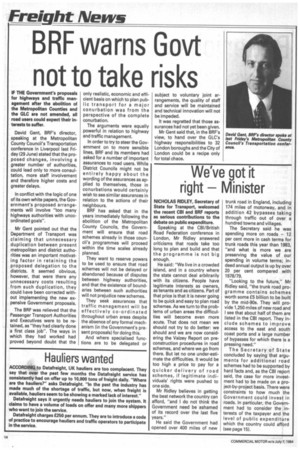BRF warns Govt not to take risks
Page 16

If you've noticed an error in this article please click here to report it so we can fix it.
IF THE Government's proposals for highways and traffic management after the abolition of the Metropolitan Counties and the GLC are not amended, all road users could expect their interests to suffer.
David Gent, BRF's director, speaking at the Metropolitan County Council's Transportation conference in Liverpool last Friday (29 June) stated that the proposed changes, involving a greater number of authorities, could lead only to more consultation, more staff involvement and therefore higher costs and greater delays.
In conflict with the logic of one of its own white papers, the Government's proposed arrangements will involve "too many highways authorities with uncoordinated goals".
Mr Gent pointed out that the Department of Transport was claiming that unnecessary duplication between present metropolitan and district authorities was an important motivating factor in retaining the proposed delegation to the districts. It seemed obvious, however, that were there any unnecessary costs resulting from such duplication, they could have been corrected without implementing the new expensive Government proposals.
The BRF was relieved that the Passenger Transport Authorities and Executives were to be retained, as "they had clearly done a first class job". The ways in which they had worked had proved beyond doubt that the only realistic, economic and efficient basis on which to plan public transport for a major conurbation was from the perspective of the complete conurbation.
The arguments were equally powerful in relation to highway and traffic management.
In order to try to steer the Government on to more sensible lines, BRF and its members had asked for a number of important assurances to road users. While District Councils might not be entirely happy about the wording of the assurances as applied to themselves, those in conurbations would certainly wish to see similar assurances in relation to the actions of their neighbours.
BRF has asked that in the years immediately following the abolition of the Metropolitan County Councils, the Government will ensure that road schemes already in those council's programmes will proceed within the time scales already planned.
They want to reserve powers to be used to ensure that road schemes will not be delayed or abandoned because of disputes between highway authorities, and that the existence of boundaries between such authorities will not prejudice new schemes.
They seek assurances that traffic management will be effectively co-ordinated throughout urban areas despite the absence of any formal mechanism (in the Government's present proposals) for doing this.
And where specialised functions are to be delegated or subject to voluntary joint arrangements, the quality of staff and service will be maintained and technical innovation will not be impeded.
It was regretted that those assurances had not yet been given.
Mr Gent said that, in the BRF's view, to hand over the GLC's highway responsibilities to 32 London boroughs and the City of London could be a recipe only for total chaos.




























































































